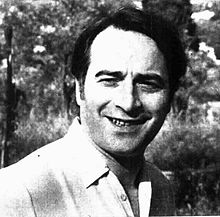Bruno Bartoletti

Bruno Bartoletti (
Life and career
Bartoletti's father was Umberto Bartoletti, a blacksmith, who also played clarinet in a Florence band. As a youth, Bartoletti played the piccolo. A teacher in Florence recognised the young Bartoletti's talent in music, and her husband, the sculptor Antonio Berti, recommended him to the Cherubini Conservatory.[3] There, he studied flute and piano.
Bartoletti later played in the orchestra of the
Bartoletti made his US conducting debut with Lyric Opera of Chicago in 1956, conducting Il trovatore, as a replacement for the indisposed Serafin. In 1964, Bartoletti was named co-artistic director of Lyric Opera, alongside Pino Donati, and served jointly with Donati until 1974. In 1975, Bartoletti became sole artistic director, and held the post until his retirement in 1999. Following his retirement, he had the title of artistic director emeritus for the remainder of his life. Bartoletti began as Lyric Opera's principal conductor in 1964,[5] and served in that capacity until 1999. Over the period from 1956 to 2007, Bartoletti conducted approximately 600 performances of 55 operas with Lyric Opera, with his final conducting appearance at Lyric Opera in a 2007 production of La traviata.[6] His other notable conducting work at Lyric Opera included conducting the US premiere of Britten's Billy Budd in 1970,[4] and the 1978 world premiere of Krzysztof Penderecki's Paradise Lost.
Bartoletti focused almost exclusively on opera in his career, with few conducting engagements in symphonic work.[3] He conducted several world premieres of works by composers such as Luciano Berio, Luigi Dallapiccola, Paul Dessau, Lodovico Rocca, Gian Francesco Malipiero, and Alberto Ginastera (Don Rodrigo, 1964). His commercial recordings Ponchielli's La Gioconda, Puccini's Manon Lescaut, and La Cena delle Beffe of Umberto Giordano (from the Opernhaus, Zürich, in 1996), as well as DVDs of Death in Venice, La bohème, Giovanna d’Arco, Macbeth, La gazza ladra, and television films of La sonnambula and Tosca.[6]
The Italian government had bestowed on Bartoletti the rank of
Bartoletti was married to the former Rosanna Sandretti, an elementary-school teacher, from 1 July 1953 until her death on 2 August 2011.[7] The marriage produced two daughters, Chiara Bartoletti and Maria Poggi, who both survive Bartoletti. Other survivors include a sister, a brother, and five grandchildren, Livia, Filippo, Arianna, Margherita, and Nicolò.
References
- ^ a b "E' morto Bruno Bartoletti". Cado In Piedi. 2013-06-09. Archived from the original on 2013-11-13. Retrieved 2013-06-09.
- ^ a b "Bruno Bartoletti, Longtime Artistic Director of Lyric Opera of Chicago, Has Died". Opera News. 2013-06-09. Archived from the original on 2013-12-03. Retrieved 2013-07-07.
- ^ a b Bruce Weber (2013-06-13). "Bruno Bartoletti, Maestro Who Shaped Lyric Opera of Chicago, Dies at 86". The New York Times. Retrieved 2013-06-15.
- ^ a b John von Rhein (June 9, 2013). "Bruno Bartoletti, longtime Lyric Opera director, dies". Chicago Tribune. Retrieved 2013-06-15.
- ^ Andrew Patner (2013-06-09). "Bruno Bartoletti, longtime Lyric Opera conductor, dies in Florence". Chicago Sun-Times. Retrieved 2013-07-07.
- ^ a b "Bruno Bartoletti, Lyric Opera of Chicago's Artistic Director Emeritus, June 10, 1926 – June 9, 2013" (Press release). Lyric Opera of Chicago. 9 June 2013. Archived from the original on 13 April 2014. Retrieved 2013-07-07.
- ^ "Rosanna Bartoletti, 1927-2011" (Press release). Lyric Opera of Chicago. 2 August 2011. Archived from the original on 23 June 2013. Retrieved 2013-07-07.
Sources
- Dictionnaire des interprètes, Alain Pâris, Éditions Robert Laffont, 1989.
External links
- Bruno Bartoletti discography at Discogs
- Bruno Bartoletti at IMDb
- Three interviews with Bruno Bartoletti: October, 1981; February, 1996; November, 1998
